HALLOWEEN ENDS & HALLOWEEN: THE CURSE OF MICHAEL MYERS Without Supernatural Elements

Amanda Mazzillo is a writer with an MFA in Dramatic…
The Halloween trilogy which started in 2018 might have distanced itself from every sequel to the 1978 original film, especially removing the supernatural druid aspects of Michael’s origin that were made the focus in the 1995 sixth installment in the franchise: Halloween: The Curse of Michael Myers, but there are unexpected connections and similarities between these two installments.
But Halloween Ends and the druid-focused Halloween: The Curse of Michael Myers bear more similarities than immediately expected, especially when we analyze the supernatural curse at the center of that film with the more metaphorical idea of Michael’s infection over Haddonfield explored in Halloween Ends.
How do these two Halloween installments, which on the surface are extremely different, compare? Did Halloween Ends take elements from Halloween: The Curse of Michael Myers and explore them in a similar fashion with their supernatural elements removed–and does this make for a more successful interpretation of similar themes of Michael’s overarching power over Haddonfield and trying to overcome our pasts?
What do Corey Cunningham (Rohan Campbell) and Tommy Doyle – as played by Paul Rudd – have in common and how do their stories bridge the gap between these distinct chapters in the saga of Michael Myers?
Memories of Halloween
Halloween Ends is not the first film in the franchise to focus a majority of its story on a character perceived as an outcast throughout Haddonfield. With Halloween Ends, Corey Cunningham becomes one of the main focuses – even above Michael himself. With Halloween: The Curse of Michael Myers we spend more time than expected with Tommy Doyle.
Both Corey and Tommy have become consumed by Michael’s presence in Haddonfield after a fateful Halloween night. For Corey, he has been accused of murdering Jeremy Allen (Jaxon Goldenberg), whom Corey is babysitting on Halloween night.
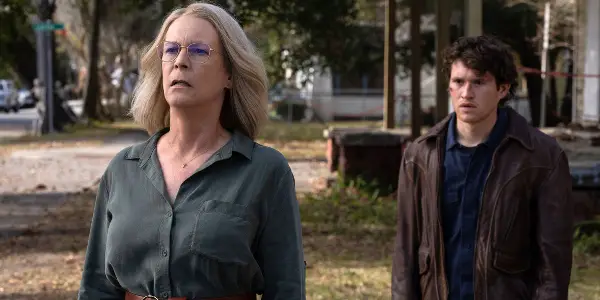
Bad things always happen on Halloween night, even when Michael isn’t around. Jeremy’s death is an accident, but this does not stop Haddonfield for accusing Corey – choosing him as their new boogeyman without Michael.
In Halloween: The Curse of Michael Myers, Tommy’s obsession of finding Michael Myers – who everyone else believes is dead – but he knows that can’t be the case. This stems from his childhood experience with Haddonfield’s boogeyman. Back in 1978, Laurie Strode (Jamie Lee Curtis) babysat Tommy, so he was right there in the middle of Michael’s carnage, and he has never forgotten this experience.
Supernatural Cult Ritual vs Metaphorical Infection
In Halloween: The Curse of Michael Myers, we learn the supernatural origin of Michael’s killing sprees and his resistance to death. This film explains Michael’s desire to kill his family as a curse put upon him by a group of druids belonging to The Cult of Thorn, which is a demonic force born from the thorn rune. This curse makes the chosen child their family on Halloween night, and in Michael’s case, he views anyone living in the house as his family.
Throughout the film, Tommy uncovers the truth of Michael’s history, trying to find a way to end it for good. In order to stop the cult from cursing a new child–one related to Michael – Tommy rescues Jamie Lloyd’s (J.C. Brandy) baby and tries to keep him away from the cult members.
Halloween: The Curse of Michael Myers brings the supernatural elements fully into the franchise, creating a literal curse to match the oft-repeated mantra that Michael is “pure evil”.
Halloween Ends takes this idea of a curse, but turns it on its head, suggesting Michael’s presence in Haddonfield has cursed the town to never move on, no matter how long Michael has been gone. Jeremy’s death happens without Michael’s real presence, but his energy permeates the night of Halloween. As we learn, Michael is not gone, but is only hiding.
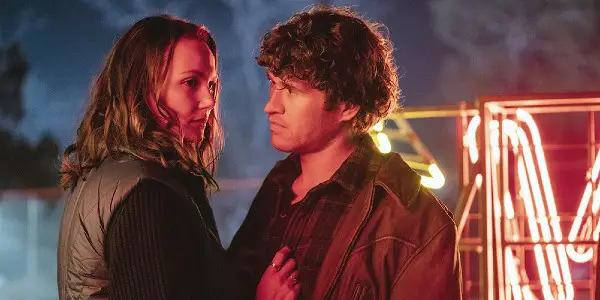
Halloween Ends explores the idea of infection within Corey. After he is attacked by bullies, Corey has a cut on his hand. Corey discovers Michael, and this is where his metaphorical curse begins. Michael spares Corey after seeing darkness within him.
As the film progresses, Corey and Allyson’s (Andi Matichak) relationship develops, both tired of living in the shadow of Haddonfield. Corey asks Allyson, “Did Michael Myers let you live or did you escape?” highlighting the glimmer of apprehension on Corey’s part. Were he and Allyson the same or is there something wrong with him?
Corey begins his killing spree without Michael – in effect killing for him while he remains hidden, cursing the town with Michael’s evil without his specific presence. Corey’s infected hand symbolizes his disenchantment with Haddonfield and his desire to leave it all behind with Allyson by his side. As this infection grows stronger, Corey is shown directly working with Michael and ultimately trying to replace him completely.
Like Tommy wants to get his old life back, Corey remains hopeful for this in his own life. He tells Allyson he sees the watchtower as a beacon to get his life back and be happy, but Corey feels the only way to achieve this return to happiness is to destroy Haddonfield for Allyson.
In Halloween Ends, every person Corey kills negatively impacted Allyson’s life (the doctor who won’t give her a promotion, her ex-boyfriend who won’t take no for an answer). Corey believes this is a necessary evil to restart his life, happy together with Allyson.
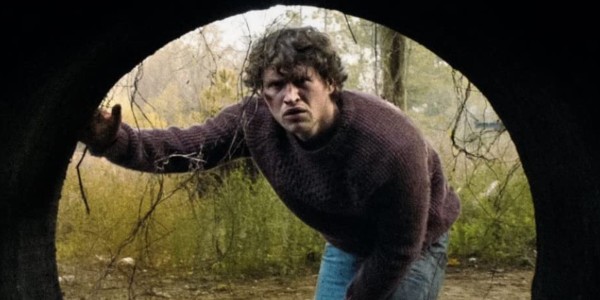
In Halloween: The Curse of Michael Myers, Tommy also feels a push to finally end Michael for good and potentially earn his life back, this time with the addition of Kara, her son Danny, and Jamie’s baby who Tommy rescued and has been taking care of with Kara’s help. What differs the two is how they go about this journey to gain back the life they feel has been stolen by Michael’s presence.
Haddonfield in Halloween Ends and Halloween: The Curse of Michael Myers are both haunted by Michael even after most people believe he is gone. In Halloween: The Curse of Michael Myers, Haddonfield is finally celebrating Halloween again after cancelling the holiday, letting Michael control how they live.
Halloween Ends also reflects the metaphor of an infection changing Corey when Jeremy’s father talks about how he always saw Corey as a nice kid. He says, “The kid who used to mow our lawn didn’t kill our son. I know that. But the guy I saw on the side of the road was down a dark path.” But the people of Haddonfield’s response to Corey – never believing him that Jeremy’s death was an accident–sent him down this path.
Outcast Protagonists
These past experiences on Halloween–fresh for Corey and years old, but not forgotten for Tommy–reflect in the film’s present depictions of Corey and Tommy as secluded outcasts who are generally looked down upon or ignored by their Haddonfield neighbors.
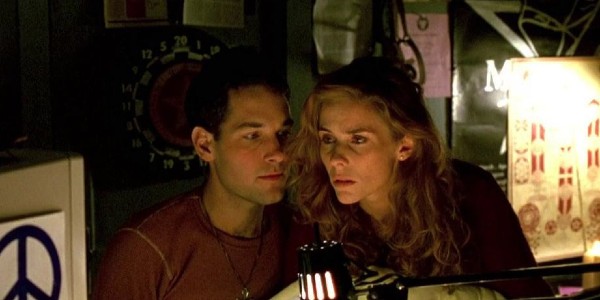
In the year after Corey’s haunting experience with the Allen family, he lives a secluded life, working with his dad at the junkyard and living with his parents. When he ventures out of his quiet life, he is met with bullies–teenagers who are disappointed Corey won’t buy them beer before realizing who he is and calling him “that psycho babysitter.”
Corey can never live down what happened, which develops into him becoming a different person: a husk of who he was before, feeling no comfort within Haddonfield anymore until he meets a kindred spirit in Allyson.
In Halloween: The Curse of Michael Myers, we meet Tommy as he stares out of his window, seemingly staring at Kara Strode (Marianne Hagan) and her family – suggesting Tommy will be the creepy outsider, possibly another antagonistic force alongside Michael.
Halloween Ends takes this planted idea and twists it. Instead of a character we immediately think of as a possible antagonist, Corey begins as seemingly the protagonist and takes on a creepier role as the film progresses. We meet Corey as a hopeful young man delt a terrible hand. The film’s opening scene is Corey’s 2018 Halloween night, so we are thrown right into his story. But as the film progresses, Corey’s stance as a central protagonist shifts into a more antagonistic role, working with and later trying to take over for Michael.
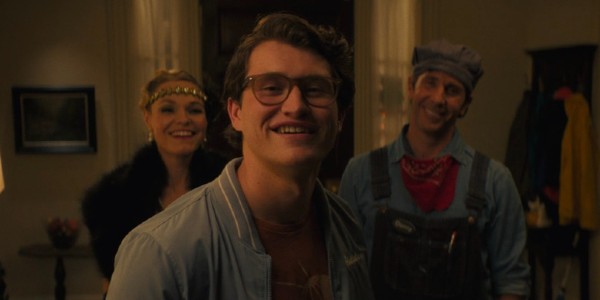
The way the people of Haddonfield view Corey as an outcast comes to the surface during the Halloween party he attends with Allyson. Allyson’s friends question her from coming to the party with him. Corey tries to forget, to have a fun night dancing and enjoying Allyson’s company, but he is never far away from the way most of Haddonfield views him as a killer. He runs into Jeremy’s mother who gets angry at him for living his life and trying to move on.
As a result of the party mishap, Corey fights with Allyson, upset that she tried to bring him back into a community where no one will ever accept him again. He says, “But the difference, Allyson, between me and you, is that people look at me like ‘who is that guy? Who is that monster?’ And they look at you like, they see you as a survivor.”
Halloween: The Curse of Michael Myers gives insight into how Haddonfield residents view Tommy. Kara says “Who’s that guy” (do Halloween 6 and Halloween Ends both share an affinity for Grease 2?) “who lives across the hall from you?” to her friend Beth (Mariah O’Brien).
Beth jokes that Kara might be interested in Tommy, which Kara quickly shoots down by explaining she caught him watching her. She finally tells Kara about Tommy solidifying his stance in the town as an outcast loner. She says, “On the weirdness scale of one to ten, he rates about a thirteen.”
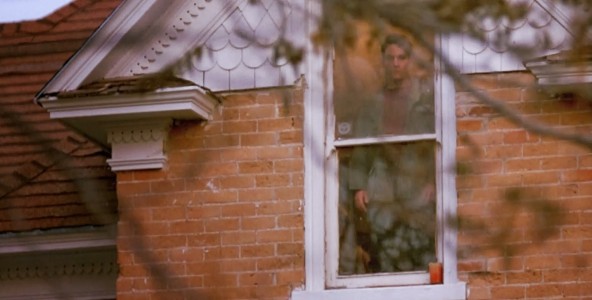
The way Tommy is shown staring out his window mirrors how Corey is shown outside Laurie’s house – where she lives with her granddaughter Allyson–standing behind a bush, reflecting on Laurie’s first experience with Michael, walking home, with this evil presence watching her.
Tommy Doyle’s room filled with newspaper clippings and recordings about Michael Myers also reflects his secluded lifestyle overtaken by his obsession with keeping tabs on Michael, waiting for his return so he is ready to fight back.
Tommy and Corey also both live in places tied to their disastrous past experiences permeated by Michael’s presence.
In Tommy’s effort to watch over Haddonfield and be its hero against Michael, he specifically moves into the boardinghouse across from the Myers house – where Kara currently lives. The reason he looks out his window all the time and locks eyes with Kara is because he hopes to see when Michael returns home.
Corey is often shown squatting in the abandoned home of the Allen family, the scene of Jeremy’s untimely death. Halloween Ends shows how this one evening changed Corey’s life and sent him down a dark path, and coming back to this house reflects how he cannot move on from that night no matter how much he might want to. Haddonfield will not let him live this down and become who he was before.
Tommy and Corey’s Diverging Paths
Both Tommy and Corey are consumed by Michael’s far-reaching presence throughout Haddonfield and how this boogeyman has impacted their individual lives.
In Halloween: The Curse of Michael Myers, the goal is to find someone to kill for Michael, to take his place. But in Halloween Ends, he finds this in Corey. But Michael’s territorial energy rejects Corey trying to completely replace him.
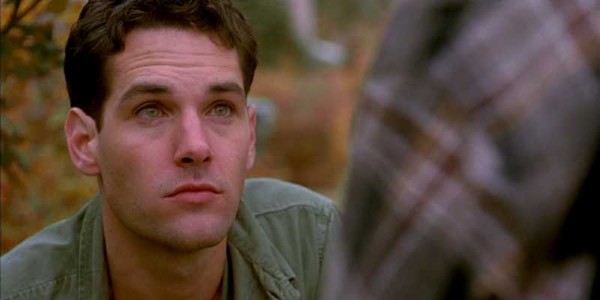
Michael’s presence haunts Corey, pushing him down a dark path, while being consumed by this pure evil presence sends Tommy down a different path, one where he hopes to stop Michael’s rise once again. He overhears Jamie Lloyd on a radio show dedicated to Haddonfield, and this pushes him into gear, wanting to help her against Michael.
Much like Corey in Halloween Ends, Tommy in Halloween: The Curse of Michael Myers takes some of the attention away from Michael, adding more focus to his quest to help Jamie and her newly born baby, which is where the supernatural elements of the film are the most present.
Conclusion:
Halloween Ends and Halloween: The Curse of Michael Myers focus on outcast protagonists Rohan Campbell‘s Corey Cunningham and Paul Rudd‘s Tommy Doyle reliving their own disastrous Halloween nights. Halloween Ends takes these ideas rooted in Halloween: The Curse of Michael Myers, exploring them removed from the supernatural. Instead of Haddonfield seeping in a druid curse, which came about through the Myers family, Haddonfield’s infection is now more symbolic in nature and touching on how quickly someone can change completely when they are no longer accepted by their community.
Does content like this matter to you?
Become a Member and support film journalism. Unlock access to all of Film Inquiry`s great articles. Join a community of like-minded readers who are passionate about cinema - get access to our private members Network, give back to independent filmmakers, and more.
Amanda Mazzillo is a writer with an MFA in Dramatic Writing from SCAD and a BA in Writing & Linguistics and Film Studies minor from Georgia Southern University. She enjoys writing comedy and exploring all forms of media. Her Twitter name is a bad pun: @mazzillofirefox













